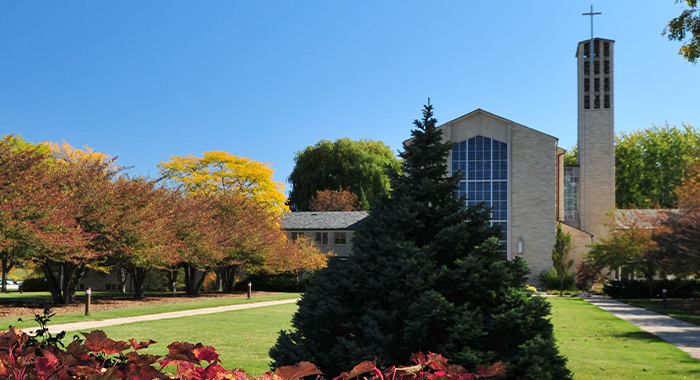St. Norbert Abbey Opens Its Doors to Afghan Refugees
The staff and Norbertines of St. Norbert Abbey welcomed eight refugees in November, providing them with clothes, food and warm beds. For the refugees, this is the end of their journey from Afghanistan and the start of their new lives in the United States.
Abbot Dane Radecki ’72 says, “The Norbertines welcome our Afghan sisters and brothers into our abbey as an expression of our hospitality. Besides food and shelter, they’ve commented how they’ve come to appreciate the abbey as a place of peace.”
The abbey is supporting the efforts and programs of Catholic Charities of the Diocese of Green Bay that provide services and advocacy to refugees. More refugees are expected to arrive in the coming weeks and months.
In addition to securing housing, Catholic Charities works with refugees to obtain Social Security numbers and work permits. At least one abbey visitor has already been able to move to a more permanent home.
A connection forged in faith
The temporary residents of the abbey experience the renowned hospitality of the Norbertines, who have provided them with a special prayer room for Muslim daily prayers (salah), offered five times throughout the day. Though they have vast cultural difference, there is a connection experienced between the two groups – Norbertine priests and Muslim guests – through their devotion to prayer and their faith in God. The Rev. David McElroy ’02, a native of Ireland, says: “As one of the foreign-born nationals at the abbey, we often have a different experience of multiculturalism and encounter, on a daily basis, others who live a different faith experience. From dietary customs to cultural adaptation, it is a lot to take in all at once. On the other side for the new arrivals to their new found home in the USA, it’s the unfamiliar smells and sounds. The homesickness and relentless worrying and shock. The ‘if onlys’ and the ‘what ifs.’
“Looking into the eyes of our newfound friends, the pain and sorrow is there. Maybe one day the healing, hope and hospitality will be real. Perhaps the first steps in that journey were made among a community of strangers who aspire to be prepared for every good work, as St. Norbert would have it.”
The winter ahead promises new experiences and new challenges for the Afghanis. Volunteers have supplied them with winter coats, and many are looking forward to their first snowfall.
Refugees tell their stories
The rapid evacuations and chaotic transatlantic migration of Afghan refugees provided a period of incredible instability for the families displaced. Three first-hand accounts witness to their trauma.
Fayaz
Fayaz, his brother and his father worked in the army, making them targets to the new regime. He recalls a chaotic exodus: “It was so crowded, people were being pushed to the ground, stomped on … night was cold, night was really cold. There were so many people.”
In the airport he was separated from his brother and evacuated to Qatar. There he learned that his brother was one of 280 people taken out of the airport and sent back into Afghanistan. After 12 days, he had a flight from Qatar to Germany to Philadelphia. From there he traveled through New Mexico before ending his journey in Wisconsin. His brother is still in hiding.
Fayaz hopes to find work in the area and send money to relatives in Afghanistan, and ultimately facilitate their journey out of the country. “We want to be active in the community,” he says.
Ali and Aazami
Ali and Aazami both worked at the Kabul International Airport on Aug. 15, 2021, when the president of Afghanistan took an unscheduled flight with an unknown destination. That evening the Taliban took over the city and airport gates. “They had guns, they were shooting in the air,” says Ali. They, along with other airport staff, moved to the NATO-controlled portion of the airport where they eventually boarded a military plane bound for Qatar – staying there in a refugee camp for 23 days. They, like Fayaz, went from Germany to Philadelphia to New Mexico and, finally, Wisconsin.
Mohammadi
Mohammadi was at the U.S. Embassy on Aug. 15, 2021. He was a special forces-trained employee at the embassy for about a year. He was directed to go home and hide that afternoon. Five days passed until he was told to go to the airport. His strong affiliation with the United States means that he is a target for the Taliban and it was not safe to remain in his country. His wife and children are still in hiding in Afghanistan.
As the Norbertine order celebrates its 900th year, it sustains the long-standing monastic tradition of hospitality, welcoming the stranger and ministering to his/her need.
Dec. 14, 2021












